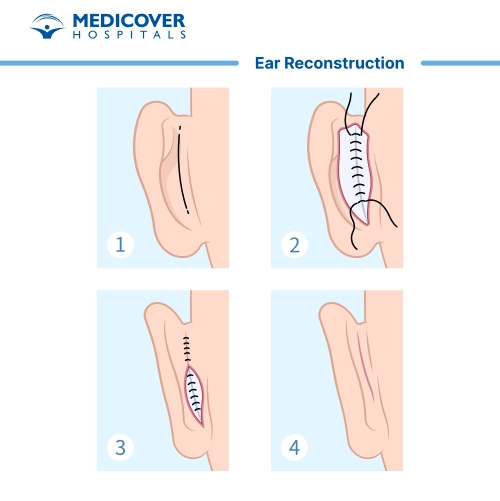What They Do for Ear Reconstruction
Ear reconstruction involves the expertise of skilled plastic and reconstructive surgeons. The procedure varies based on the individual's unique situation. It can encompass reshaping the existing ear, creating a new ear using grafts or implants, and addressing any functional issues related to hearing or aesthetics.
If you or a loved one requires ear reconstruction due to congenital anomalies, trauma, or other ear-related conditions, consulting a qualified plastic surgeon with expertise in ear reconstruction is essential. These specialists have the knowledge and skills to assess the situation, recommend appropriate techniques, and perform the necessary surgery.
How to Prepare for Ear Reconstruction
Preparing for ear reconstruction involves comprehensive consultations with the chosen plastic surgeon. Medical history, expectations, and desired outcomes will be discussed. Depending on the technique used, you may need to undergo imaging scans or assessments to ensure a tailored approach to your reconstruction.
What Happens During Ear Reconstruction
During ear reconstruction, the chosen technique will be employed to restore the ear's shape and function. This might involve using cartilage grafts from other parts of the body, tissue expanders, or prosthetic implants. The procedure's intricacies depend on the extent of reconstruction required and the chosen surgical method.
Recovery After Ear Reconstruction
After surgery, you'll be monitored and provided with post-operative care instructions. Some discomfort, swelling, and mild pain are expected. Pain management and wound care will be provided to facilitate healing.
Lifestyle Changes After Ear Reconstruction
While ear reconstruction primarily focuses on physical restoration, there may be some lifestyle adjustments to consider. Protecting the reconstructed ear from trauma and sun exposure is crucial. Maintaining a proactive approach to ear care, following any recommended hygiene practices, and attending scheduled follow-up appointments< are vital for long-term success.
In conclusion, ear reconstruction is a transformative procedure that restores not only physical appearance but also self-confidence and functionality. By seeking guidance from specialized plastic surgeons, preparing adequately, following post-operative care instructions, and making necessary lifestyle adaptations, individuals can achieve successful outcomes and embrace a renewed sense of well-being.


